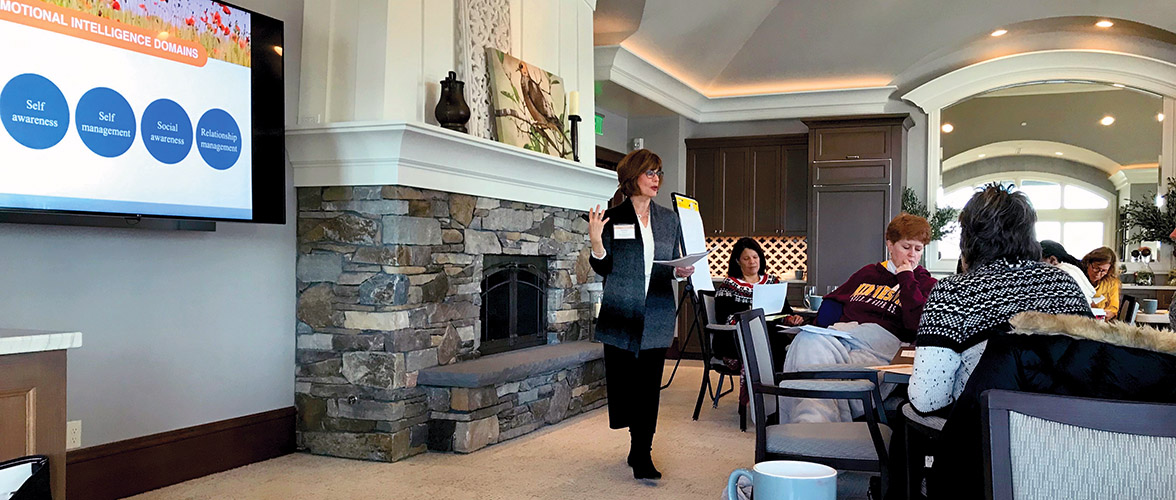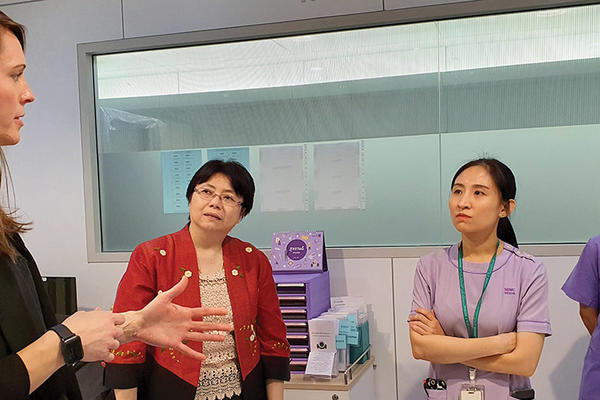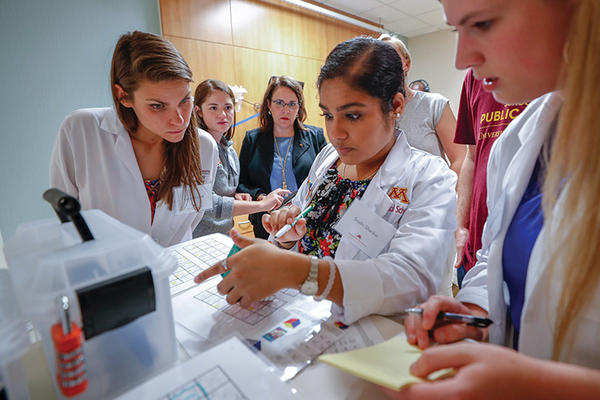Retreating for wellbeing
New series aims to help leaders develop personal, organizational strategies for balance of mind, body and spirit
March 26, 2020
Suzy Frisch

As a regular practitioner of mindfulness techniques, Wendy Looman, PhD, APRN, CPNP-PC, knows how far these practices go to reduce stress and make self-care a way of life.
She wanted to find a way to support colleagues in the School of Nursing along the same journey.
Looman, a professor and chair of Nursing’s Child and Family Health Cooperative, was thrilled to discover ways to bring a mindfulness and wellbeing approach to the school through the Earl E. Bakken Center for Spirituality & Healing’s new Wellbeing Leadership Retreat Series.
“The series has helped me think about faculty and staff and their needs for growth, development and wellbeing,” said Looman. “How we can be more intentional about creating a community in the School of Nursing and supporting the wellbeing of others through words, policies and actions.”
During three retreats at Charlson Meadows in Victoria, Looman and other participants , including School of Nursing’s Cheri Friedrich and Breanne Krzyzanowski, spent time on their personal wellbeing, including self-assessments and experiential activities. They explored ways to engage colleagues in reflecting on organizational strengths, gaps and challenges, and learned how to develop strategies to improve personal and organizational wellbeing.
The Bakken Center launched its inaugural series with 36 faculty and staff from the University’s health sciences, aiming to give leaders tools and inspiration to address the stress and burnout in health care fields. Mary Jo Kreitzer, PhD, RN, FAAN, Bakken Center director and School of Nursing professor, said such work is key because wellbeing forms the foundation of clinical and organizational excellence.
The quadruple aim of health care highlights the importance of care team wellbeing. Without it, Kreitzer said, it’s difficult to achieve the other aims of improving population health, enhancing patient experiences and reducing the cost of care. “There is a growing recognition that wellbeing in the workplace is critical. Yet many leaders aren’t clear on the steps required to lead a culture change,” she said.
Taking aim at stress and burnout
In developing the series, Bakken Center leaders wanted to take action on persistent concerns about stress, burnout and fading engagement in the workplace. They also responded to leaders who frequently ask for help with these issues, said Sue Nankivell, director of business development and community relations. “We want to give people tools to evolve and support the wellbeing of their employees, patients and the organization itself,” Nankivell said.
Role modeling wellbeing
Dianne Neumark-Sztainer, a professor and head of the Division of Epidemiology and Community Health, found that the series validated her personal and professional commitment to taking care of herself through yoga and researching its effects on body image and weight issues. As the leader of a large School of Public Health division, Neumark-Sztainer often feels torn between supporting roughly 400 faculty, staff and graduate students in their wellbeing while advocating for them to work hard, pursue grants and produce strong research. Hearing participants talk about similar struggles and ways they approach these concerns was helpful.
“I try to role model it by talking about taking time in the morning to do yoga or going on vacation,” Neumark-Sztainer said. “When people have a stronger sense of wellbeing, they are more engaged. And when they are more engaged, they are more productive. I will be sharing with faculty that these concepts aren’t contradictory and that they go together.”
And that’s what the retreat series is all about — fostering conversations and supporting wellbeing for people who are devoted to helping others and leading the way.
Learn more about this series by contacting Sue Nankivell, director of Business Development and Community Relations, at sue@umn.edu or 612-626-2395.


